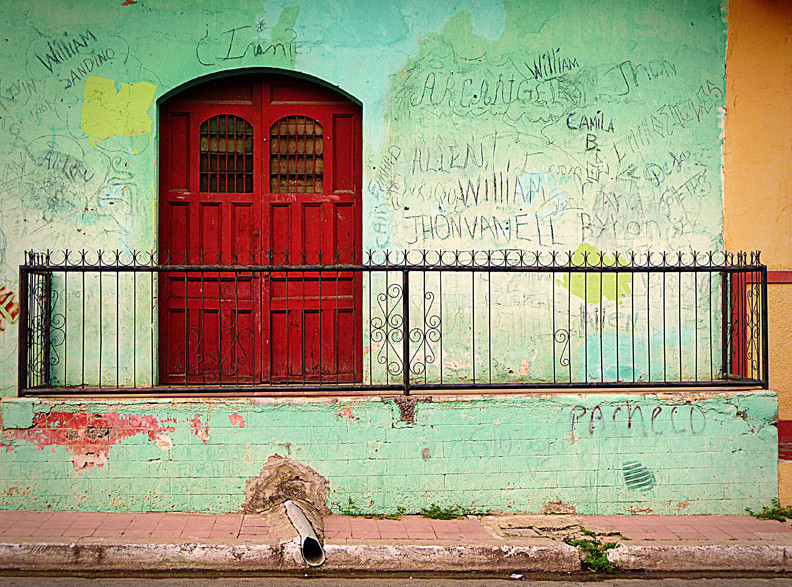Nicaragua is considered one of the safer countries in Central America. Tourism-related crime like petty theft and scam artists (and the occasional robbery and assault) sometimes occur, usually at night and involving alcohol. There have also been some problems with carjacking by criminals posing as police. For the moment, Nicaragua has mostly escaped the gang violence that has plagued the cities of Guatemala, El Salvador, and Honduras.

Red Door in Granada, Nicaragua by Angie Harms licensed Creative Commons Attribution.
No one should take a cab when the driver has a friend riding up front—complain loudly if he tries.Smugglers, mafiosos, dealers, and crackheads are found along the Atlantic coast, where drug-related crimes threaten local communities, although to a lesser extent in recent years. The Corn Islands have experienced several rapes, and San Juan del Sur experienced an extreme wave of violence in 2008 that included a kidnapping. In 2015, a woman was accosted while walking on an isolated road outside of town. In 2014 a tourist was raped and killed after walking some distance along the beach from the Montelimar resort. The Tipitapa-Masaya highway, formerly a convenient shortcut for going from the airport to Granada while avoiding Managua, is increasingly dangerous at night as it is the scene of fake “police inspections” that end up with foreign tourists being forced to go from ATM to ATM, withdrawing cash.Before traveling, check official reports, including the U.S. State Department’s warnings and the travel forums at www.gotonicaragua.com. Managua is the city with the most crime. Big cities, like Estelí and Chinandega, have neighborhoods you should skip as well (ask at your hotel to get the most updated local info). Avoid traveling alone, especially in remote areas including beaches, at night or while intoxicated, and pay the extra dollar or two for a cab. No one should take a cab when the driver has a friend riding up front—complain loudly if he tries—and pay attention to your surroundings and where you are going.
You are most at risk of pickpocketing (or hat/watch/bag snatching) in crowds and on public transport. Keep a low profile and leave flashy jewelry, watches, and expensive sunglasses at home. Keep your cash divided up and hidden in a money belt, sock, or your undergarments (take a cue from the many Nica women pulling córdoba bills out of their cleavage).
Immediately report crimes to the local police department (dial 118), at a minimum because your insurance company back home will require an official police report before reimbursing you. Nicaraguan police have good intentions but few resources. Don’t be surprised if you are asked to help fill up a vehicle with gas. This is annoying but not uncommon, and chipping in for $20 of gas will help get the job done. While police corruption does exist (Nicaraguan police earn very little), the Nicaraguan police force is notably more honest and helpful than in some Central American nations, and has gotten more professional during the Ortega administration.
Excerpted from the Sixth Edition of Moon Nicaragua.